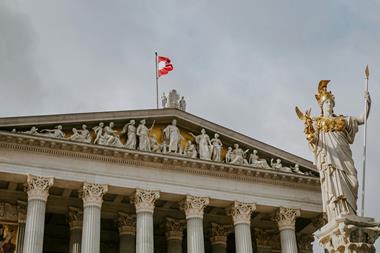Inflationary fears are exaggerated according to veteran fixed income specialist Joop Bresser. He spoke to Miranda Schoutsen about his concerns over deflation
Joop Bresser began his career at Amro Bank in 1966 and retired in March as director of fixed income at Delta Lloyd Asset Managment. He is less concerned with the spectre of inflation than with the prospect of inflation falling.
Most assume food and energy price hikes will lead to higher inflation worldwide. But Bresser disagrees. “If the US enters recession in coming quarters then there’s a real risk of deflation,” he says.
He knows he is in a minority, but does not hesitate to fight his corner. In the office of AFS Capital Management, the Amsterdam asset manager where he works as an adviser, he sets out his view.
“I’m not denying that inflation expectations have shot up. Food and energy prices have risen spectacularly. But the developments we’ve seen have been misunderstood. These price increases have nothing to do with structural changes to demand and supply.” First, core inflation must be separated out from increases in energy and food prices. “The oil price has risen from $24 at the beginning of this century to $124 now, while core inflation in the US, excluding energy and food, is only at 2% at the moment. In Europe, the levels are around 2%. That means other forces are at work.”
The second point is that increases in the prices of raw materials and food are not exorbitant and there is no evidence of structural shortages. Bresser sees no lasting changes in consumption patterns for food and raw materials. “People often talk about sharply rising energy consumption in developing economies. But look at China. Oil only meets around 20% of China’s energy needs. About three quarters of the country’s energy needs are met with coal and 5% comes from nuclear energy. That last number will double in coming years as more nuclear power plants are built.
In the longer term, Bresser concedes, the oil price will certainly rise - but not in a way that must necessarily lead to higher inflation. “In 2020, the oil price could easily hit $200, but on a yearly basis that’s a relatively modest increase. In short, you have to put everything into perspective. Technology has also improved in recent years. Look at Canada, which is doing very well out of exploiting oil sands.”
Even the widely held view that worldwide oil reserves are starting to run out causes him no concern. “They’ve been saying this for years. But a huge new oil field has just been discovered in Brazil. Furthermore, many of
alternative energy sources have been developed. The amount of energy available at the moment is quite enough to sustain normal economic growth.”
The same goes for food, Bresser believes. “You have to bear in mind that food prices have risen very modestly in relative terms over the past 25 years. To some extent, we are just reverting to the mean. In principle, there is more than enough agricultural land and technology available to feed the entire world.” Bresser adds that the price of agricultural produce has also been driven up by demand for biofuels. He believes agriculture is an uneconomic source of energy and that governments should stop subsidising the production of biofuels like ethanol.
In short, the link between rising raw materials prices and inflation is not that close: “There is no reason to think a rise in raw materials prices will lead to higher prices in the long term. And by ‘long term’ I mean a period of 12 to 18 months.”
Bresser also believes we are in an unusual situation and that raw materials prices will start to fall again. “The current supply-demand situation in the oil market justifies a price of around $85, rather than the $120 we’ve just hit. Fundamental factors do not explain the differences,” he insists. For one thing, there is too much money around that cannot be invested profitably. Around the world, monetary authorities have been reacting to the credit crisis by cutting interest rates and flooding markets with liquidity.
A growing trend towards protectionism is another factor. Many countries facing food shortages are responding with new regulation and protectionist rules. “But that only pushes food prices up even higher,” Bresser says. “You could say that rescuing the American financial system has pushed up food and energy prices so high that the rescue action has had an indirect impact on poor countries.”
Overall, Bresser sees no reason to worry about stagflation. “People are nervous about the prospect of the kind of stagflation we saw in the 1970s. But the comparison makes no sense. Growth was higher than average in those years, whereas now economic growth has been slowing in the US, Europe and even in China. That will lead to slowing energy demand. Furthermore, we have much more productive labour than we had then.” Companies continue to be highly cost-conscious, Bresser continues. And companies can go further with outsourcing, meaning that labour productivity will continue to rise.
Even rising wage demands, especially in Europe, are not that serious, he says. Wage increases, he insists, are no higher than necessary: “Rising labour productivity, justifies reasonable wage increases. Bresser believes workers in the 1970s were better compensated as currencies devalued. “I remember my salary rising 10% on one occasion. Of course, inflation stood at 12% at that point.”
He accepts that compensating for falling purchasing power creates great upward pressure on inflation. “But these corrections are hardly taking place. Labour costs per unit of production are not rising. If that were to happen, then we would have reason to expect structurally higher inflation.”
Labour productivity is still rising around the world. “Developing countries are adopting new technologies more quickly. That process is not yet at an end. Companies are still looking for ways to produce as cheaply as possible.” Bresser points out that productivity in the US rose 2.2% in the past month. “That means that the prices per unit of production are actually falling. But this does not point to an inflationary trend - on the contrary.”
Things are very simple, the economist concludes: inflation is more likely to be too low than too high. “Economic growth is slowing and consumer spending is falling. No economic textbook tells us that slowing growth is coupled with structurally higher inflation.” In truth we should be glad of rising food and energy prices, Bresser maintains. “Otherwise we’d now be in a deflationary environment. And if the US enters a recession in coming quarters, then we still run a real risk of deflation.”












